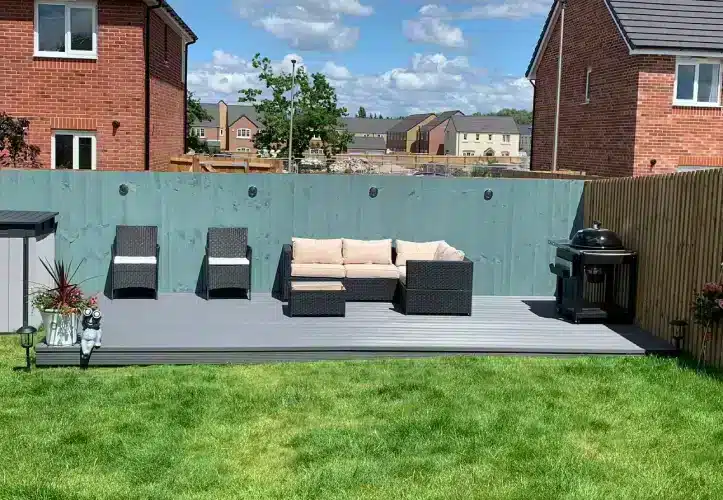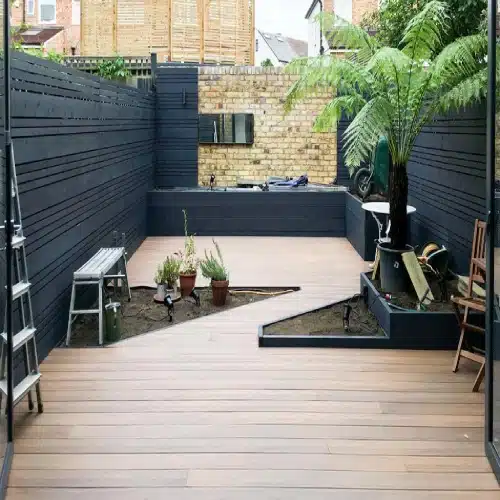Is a Composite Fence Better Than Wood?
Will a composite decking board rot? In short no. Wood will rot if you expose it to moisture. Unlike wood, composite decking boards do not rot. Composite decking is resistant to rot even if exposed to moisture. This benefit of composite decking is a distinct advantage over wood decking. To understand why a composite board does not decay, let’s see what composite decking is.
The word “composites” mean a combination of two different materials. Composite Decking contain reclaimed wood fibres and recycled HDPE recycled plastics. The combination of these two materials makes composite decking boards superior to wood decking.
Wood is a naturally beautiful decking material. The latest innovations, designs and techniques to produce composite decking can mimic the natural appearance and beauty of wood. With certain brands of composite decking the boards ae indistinguishable from real wood. However, composite boards are more durable and can last for decades longer than wood with minimal maintenance. Composites are stronger and resistant to splintering, cracking, warping and will not rot like wood.
Composite boards are also easier to maintain than wood. If you have a composite deck, you can easily maintain it without spending too much money. With wood, you have to sand wood annually before treating it with sealers and stains to prolong its lifespan and protect against rot and decay.

Why Composite Decking Does Not Rot
Composite decking is durable and resistant to water and moisture. A composite decking board consists of wood fibres and recycled plastics. These materials are combined with a bonding agent to form a durable decking board. The wood in the decking gives the board its strength, while the plastics provides the composite board with resistance to water and moisture.
Wooden decking, unlike composites, will swell if it absorbs water or moisture. In the presence of water or high humidity, wood will eventually rot and decay. Eventually the wood breaks down and the structure becomes unsafe or eventually fails.
As the main cause to rot and decay is moisture with wood, composite decking eliminates this with its resistance to water, its key to note that composite decking isn’t waterproof and can still swell, but with its high density plastic make up this improves its water resistance and eliminate the possibility of the boards rotting like wood.
Types of Composite Decking Board
However, there are two types of composite decking material you can use to build decking. There is first and second generation composite decking boards.
1 Capped Composite Decking
Capped composite decking boards have higher water resistance. This is the most common type of composite decking homeowners prefer. One reason is that capped composite decking has a plastic coating on its outer layer. The plastic coating around the capped composite decking board makes it difficult for water or moisture to penetrate it.
Because they have high resistance to water or moisture, capped composite decking boards are suitable in high moisture areas. You can install it by the pool or hot tub without worrying that the decking will swell or rot.
2 Uncapped composite decking
Uncapped composite decking boards differs from capped decking as it does not have a plastic coating around it. Uncapped composite decking boards are less resistant to water than capped decking. They are not suitable for use in places with high moisture. But this does not mean that uncapped decking will not last as long. They are also durable and less resistant to moisture and water penetration when compared to wood, this enables uncapped composite boards to last a lot long in high moisture areas, when comparing with wood.
However, uncapped composite boards are better suited with areas with less moisture. So, if the place you want to install your deck is dry, uncapped composite decking boards will be suitable for building a deck. If you are building a deck and the area will have a lot of water or moisture then capped decking would be your the preferred option.
If your set on uncapped boards and your planning to build the decking over a shaded area, you can use uncapped composite boards in high moisture locations. The shade will protect the decking and keep it from absorbing water.
Conclusion
Will a composite board rot? No. Composite decking is resistant to water and moisture absorption which stops the board from rotting.
How to Calculate How Many Decking Boards I Need




